Getting used to the free market rule
Updated: 2013-10-14 06:56
By Hong Liang (China Daily)
|
||||||||
A Hong Kong friend who had just moved to Shanghai told me she was shocked by the high prices. I guess she's just not very adventurous, shopping for imported foods at high-end supermarkets and eating out at fancy restaurants.
Having worked and lived in a number of developing countries in the region, I learned long ago that if I had insisted on maintaining the same lifestyle that I'd had in Hong Kong, I'd have to pay dearly for it. That's true to some extent even in Shanghai, where a cup of cappuccino at Starbucks costs more than it does in Hong Kong.
Unreasonable as that may seem, there are many Starbucks outlets in Shanghai, and many of them appear to be doing well. There are many people here who don't seem to mind paying the price for the luxury they believe they deserve. That's the free market in action, and it is hard to understand why the pricing of foreign brands, ranging from coffee at Starbucks to automobiles from Germany, has become such a big issue on the mainland.
The domestic media, led by CCTV, have mounted a campaign against what they consider rampant overcharging by foreign vendors in the mainland market. The latest objects of their wrath are Starbucks, which they noted exacts a much higher profit margin in China than it does in other markets; and French fashion house Chanel, which is selling one of its skin-care products in China at prices that are many times those in other markets.
Earlier, these consumer vigilantes zoomed in on the makers, mainly Germans, of luxury cars, accusing them of profiteering in the mainland market. The evidence most often cited is the chart showing the much lower prices of various Mercedes models in the United States than in China. For instance, a news report noted that the factory-recommended price of a Mercedes S-class sedan in China is more than 150 percent higher than the model with the same specs in the United States.
Of course, everybody knows that tariffs, sales taxes and myriad of other charges have contributed to push up prices of a wide range of consumer goods on the mainland. But the price hawks wouldn't want to accept that because doing so would have rendered their existence irrelevant. Rather, they insisted that even after stripping out all those charges, the vendors of foreign branded goods are still guilty of fleecing their Chinese customers, not just in the pricing of their wares but also on the after-sale service.
A rather lengthy report notes that changing the wheels at a Mercedes dealership costs thousands of yuan just for the service. I was a car owner for many years, and never had I ever thought of going to the dealership for a wheel change. I am sure there is no shortage of garages in most mainland cities who can do that for a much cheaper price. If the car owner insisted on going to the dealer for such an elementary job, he wouldn't have minded the cost, I would guess.
Indeed, the domestic media has made a big case of the alleged poor after-sale service provided by foreign-brand vendors who were accused of "bullying" mainland consumers. In many cases, it's the bad attitude of the sales attendants at the shop floor and the repair centers that gave the impression of discrimination against mainland consumers.
I had such a bad experience once when I brought my damaged pad to the repair center of a noted Japanese vendor. But I can't imagine that the manufacturer has a standing policy to mistreat customers on the mainland. Of course, it's at fault. It hired the wrong people. And so have the many domestic department stores, restaurants and service providers, which are known for their poor service.
In a free-market environment, vendors who overcharge their customers or provide poor after-sale service wouldn't survive long because nobody would want to buy anything from them. The luxury-goods retail market on the mainland is pretty open and free. If all the criticisms leveled at them were accurate, they should have gone out of business long ago.
The reason they are still here and many of them doing quite well is because there is no shortage of customers willing to pay the price the vendors ask for and tolerate the service they provide for the privilege of being seen driving luxury cars or carrying designer bags.
It's the law of supply and demand. Get used to it.
(China Daily 10/14/2013 page8)

 Chinese education for Thai students
Chinese education for Thai students
 Djokovic retains Shanghai Masters title
Djokovic retains Shanghai Masters title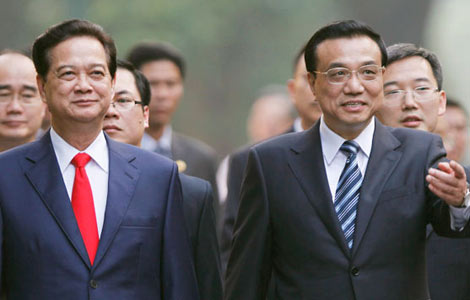
 Working group to discuss sea issues
Working group to discuss sea issues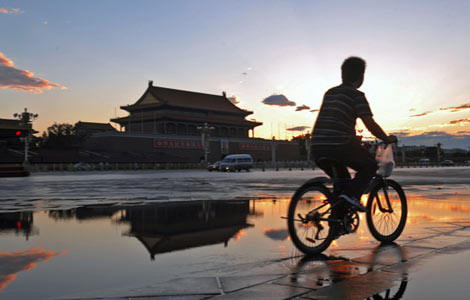
 Draft regulation raises fines for polluters
Draft regulation raises fines for polluters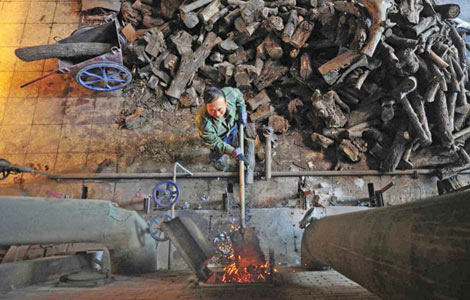
 Other measures for the capital to become green
Other measures for the capital to become green
 Colombian takes wingsuit crown
Colombian takes wingsuit crown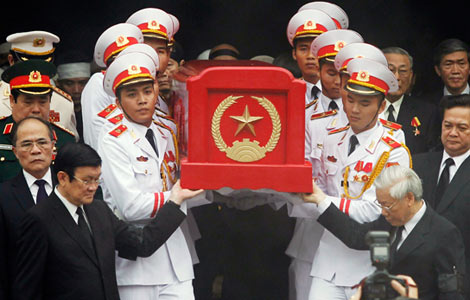
 Vietnam buries heroic general
Vietnam buries heroic general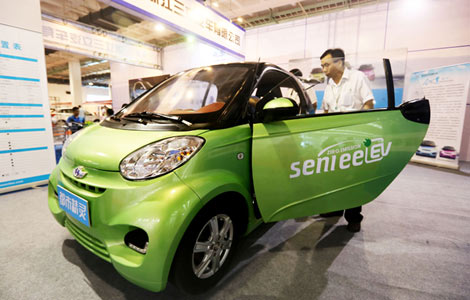
 Road to clean air starts with new energy vehicles
Road to clean air starts with new energy vehicles
Most Viewed
Editor's Picks

|

|

|

|

|

|
Today's Top News
No new findings over Arafat's death: official
Chinese firm joins UK airport enterprise
Senate leader 'confident' fiscal crisis can be averted
Working group to discuss sea issues
Man hospitalized years after amputating own leg
Detained US citizen dies in Egypt
Senate leads hunt for shutdown and debt deal
Draft rule raises fines for polluters
US Weekly

|

|







